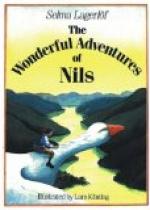My! but it was dismal to sit in that way the whole night through, out in the forest! He never before understood the real meaning of “night.” It was just as if the whole world had become petrified, and never could come to life again.
Then it commenced to dawn. The boy was glad that everything began to look like itself once more; although the chill was even sharper than it had been during the night.
Finally, when the sun got up, it wasn’t yellow but red. The boy thought it looked as though it were angry and he wondered what it was angry about. Perhaps it was because the night had made it so cold and gloomy on earth, while the sun was away.
The sunbeams came down in great clusters, to see what the night had been up to. It could be seen how everything blushed—as if they all had guilty consciences. The clouds in the skies; the satiny beech-limbs; the little intertwined branches of the forest-canopy; the hoar-frost that covered the foliage on the ground—everything grew flushed and red. More and more sunbeams came bursting through space, and soon the night’s terrors were driven away, and such a marvellous lot of living things came forward. The black woodpecker, with the red neck, began to hammer with its bill on the branch. The squirrel glided from his nest with a nut, and sat down on a branch and began to shell it. The starling came flying with a worm, and the bulfinch sang in the tree-top.
Then the boy understood that the sun had said to all these tiny creatures: “Wake up now, and come out of your nests! I’m here! Now you need be afraid of nothing.”
The wild-goose call was heard from the lake, as they were preparing for flight; and soon all fourteen geese came flying through the forest. The boy tried to call to them, but they flew so high that his voice couldn’t reach them. They probably believed the fox had eaten him up; and they didn’t trouble themselves to look for him.
The boy came near crying with regret; but the sun stood up there—orange-coloured and happy—and put courage into the whole world. “It isn’t worth while, Nils Holgersson, for you to be troubled about anything, as long as I’m here,” said the sun.
GOOSE-PLAY
Monday, March twenty-first.
Everything remained unchanged in the forest—about as long as it takes a goose to eat her breakfast. But just as the morning was verging on forenoon, a goose came flying, all by herself, under the thick tree-canopy. She groped her way hesitatingly, between the stems and branches, and flew very slowly. As soon as Smirre Fox saw her, he left his place under the beech tree, and sneaked up toward her. The wild goose didn’t avoid the fox, but flew very close to him. Smirre made a high jump for her but he missed her; and the goose went on her way down to the lake.
It was not long before another goose came flying. She took the same route as the first one; and flew still lower and slower. She, too, flew close to Smirre Fox, and he made such a high spring for her, that his ears brushed her feet. But she, too, got away from him unhurt, and went her way toward the lake, silent as a shadow.




